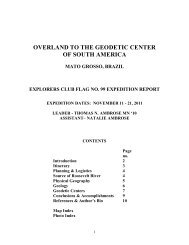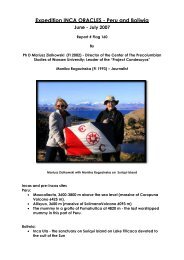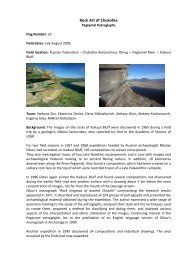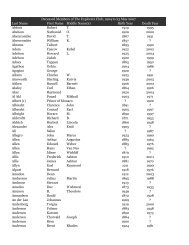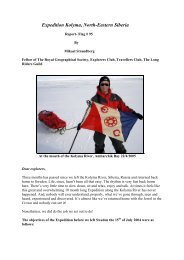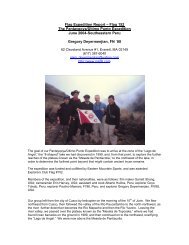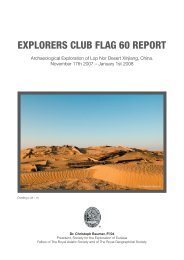the explorers journal the climate change issue - The Explorers Club
the explorers journal the climate change issue - The Explorers Club
the explorers journal the climate change issue - The Explorers Club
You also want an ePaper? Increase the reach of your titles
YUMPU automatically turns print PDFs into web optimized ePapers that Google loves.
explorer Lonnie Dupre, 46, and<br />
a team of Inuit companions<br />
and <strong>explorers</strong> will begin an<br />
epic dogsled journey through<br />
<strong>the</strong> High Arctic, traveling in <strong>the</strong><br />
footsteps of Robert E. Peary,<br />
who with Mat<strong>the</strong>w A. Henson<br />
and a team of Inuit, became <strong>the</strong><br />
first men to reach <strong>the</strong> North Pole<br />
on April 6, 1909. Although <strong>the</strong><br />
claim was disputed by skeptics,<br />
it was upheld in 1989 by <strong>the</strong><br />
Navigation Foundation (www.<br />
navigationfoundation.org).<br />
According to Dupre, a resident<br />
of Grand Marais, MN, <strong>the</strong><br />
five-month project will begin in<br />
January 2009 with a month and<br />
a half of training dogs, preparing<br />
equipment, and living with<br />
<strong>the</strong> polar Inuit of <strong>the</strong> Qaanaaq<br />
district of northwest Greenland.<br />
<strong>The</strong>n, on February 17, <strong>the</strong> day<br />
<strong>the</strong> sun comes back at <strong>the</strong> end<br />
of four months of polar night,<br />
a team of six <strong>explorers</strong>, three<br />
sleds, and 36 dogs will depart<br />
on <strong>the</strong> 2,400-kilometer journey.<br />
While <strong>the</strong> team is not venturing<br />
to <strong>the</strong> North Pole, <strong>the</strong>y plan to<br />
document all of Peary’s historic<br />
huts, camps, depots, and cairns<br />
in Canada and Greenland.<br />
Dupre will also develop a “Not<br />
Cool” campaign to explain how<br />
<strong>climate</strong> <strong>change</strong> is affecting Inuit<br />
culture and how pollution is<br />
threatening wildlife. For more<br />
information contact: Lonnie<br />
Dupre at lonnie@boreal.org, or<br />
visit www.lonniedupre.com.<br />
How North is North?<br />
12<br />
A once and future land<br />
In July, <strong>the</strong> Euro-American North<br />
Greenland Expedition 2007<br />
flew to <strong>the</strong> nor<strong>the</strong>rnmost coast<br />
of Greenland, <strong>the</strong>n headed<br />
out on <strong>the</strong> sea ice to establish<br />
EXPLORATION NEWS<br />
whe<strong>the</strong>r <strong>the</strong>re is a more nor<strong>the</strong>rly<br />
point of permanent land<br />
than Kaffeklubben Island, <strong>the</strong><br />
currently established nor<strong>the</strong>rn<br />
point. Oodaaq Island was<br />
discovered some 1360 meters<br />
north of Kaffeklubben in 1978,<br />
but it has since vanished into<br />
<strong>the</strong> ocean.<br />
Team member Jeff Shea of<br />
Point Richmond, CA, told us,<br />
“We stood on an ‘island’ north<br />
of Kaffeklubben. I put it in quotes<br />
because it appeared to be sitting<br />
on top of <strong>the</strong> sea ice, but we’re<br />
not sure if it was connected to<br />
land. This is representative of<br />
<strong>the</strong>se impermanent features off<br />
<strong>the</strong> north coast of Greenland<br />
near Kaffeklubben. This feature<br />
was shown in a 2005 satellite<br />
image appearing in much <strong>the</strong><br />
same shape as it is in now.<br />
“It looks like an island, but<br />
time will tell if it’s determined<br />
to be <strong>the</strong> nor<strong>the</strong>rnmost,” Shea<br />
says. “For now, we dubbed it<br />
Stray Dog West.”<br />
Nepal seeks peak<br />
fee cut<br />
Everest more economical?<br />
Ang Tshering Sherpa, president<br />
of <strong>the</strong> Nepal Mountaineering<br />
Association, is campaigning to<br />
reduce peak fees in his country<br />
in order to attract more climbers.<br />
<strong>The</strong> Nepalese government<br />
has formed a Royalty Revision<br />
Committee, and Ang Tshering’s<br />
hope is that fees will be reduced<br />
across <strong>the</strong> board, according to<br />
<strong>the</strong> American Alpine <strong>Club</strong> News.<br />
In general, Nepal’s peak fees are<br />
higher than those of comparable<br />
mountains in Pakistan, India,<br />
and even China. According to<br />
Reuters, Nepal is already considering<br />
a 50 percent cut in its<br />
peak fees for Everest’s relatively<br />
unpopular fall season.<br />
With <strong>the</strong> end of <strong>the</strong> decadeold<br />
Maoist insurgency last year,<br />
tourism has rebounded in Nepal<br />
(up 36 percent in <strong>the</strong> first seven<br />
months of 2007 compared to<br />
2006) but it is still far below<br />
historical levels. Ang Tshering<br />
asks that climbers and guides<br />
e-mail <strong>the</strong>ir comments on reducing<br />
peak fees to office@nepal<br />
mountaineering.org and to<br />
<strong>the</strong> Ministry of Tourism at<br />
tourism@mail.com.np.<br />
<strong>The</strong> Not So<br />
B l u e D a n u b e<br />
Pollution threatens a European wonder<br />
Eighteen environmental scientists<br />
spent seven weeks traveling<br />
down <strong>the</strong> 2,375-kilometer<br />
Danube to “give <strong>the</strong> river a health<br />
checkup,” according to Philip<br />
Weller, executive secretary of<br />
<strong>the</strong> International Commission<br />
for <strong>the</strong> Protection of <strong>the</strong><br />
Danube River, which organized<br />
<strong>the</strong> study. Known as <strong>the</strong> Joint<br />
Danube Survey 2, <strong>the</strong> trip began<br />
on August 14 in Regensburg,<br />
Germany, and ended in late<br />
September in in Romania and<br />
<strong>the</strong> Ukraine. Weller said <strong>the</strong><br />
goal was to ga<strong>the</strong>r information<br />
to improve Danube-related<br />
policies of <strong>the</strong> countries along<br />
<strong>the</strong> river, home to more than 80<br />
million people. For more on this<br />
project, see www.icpdr.org/jds.




